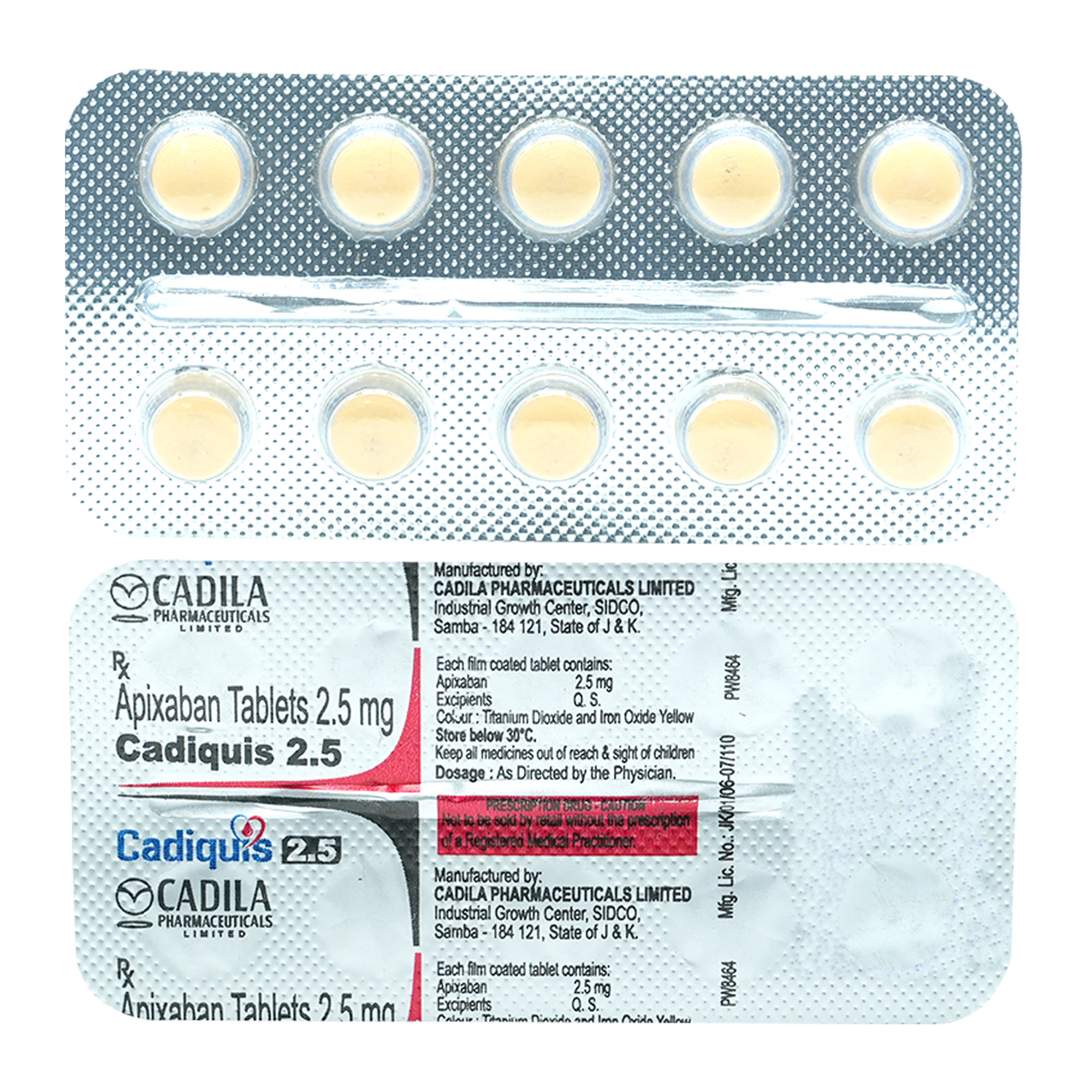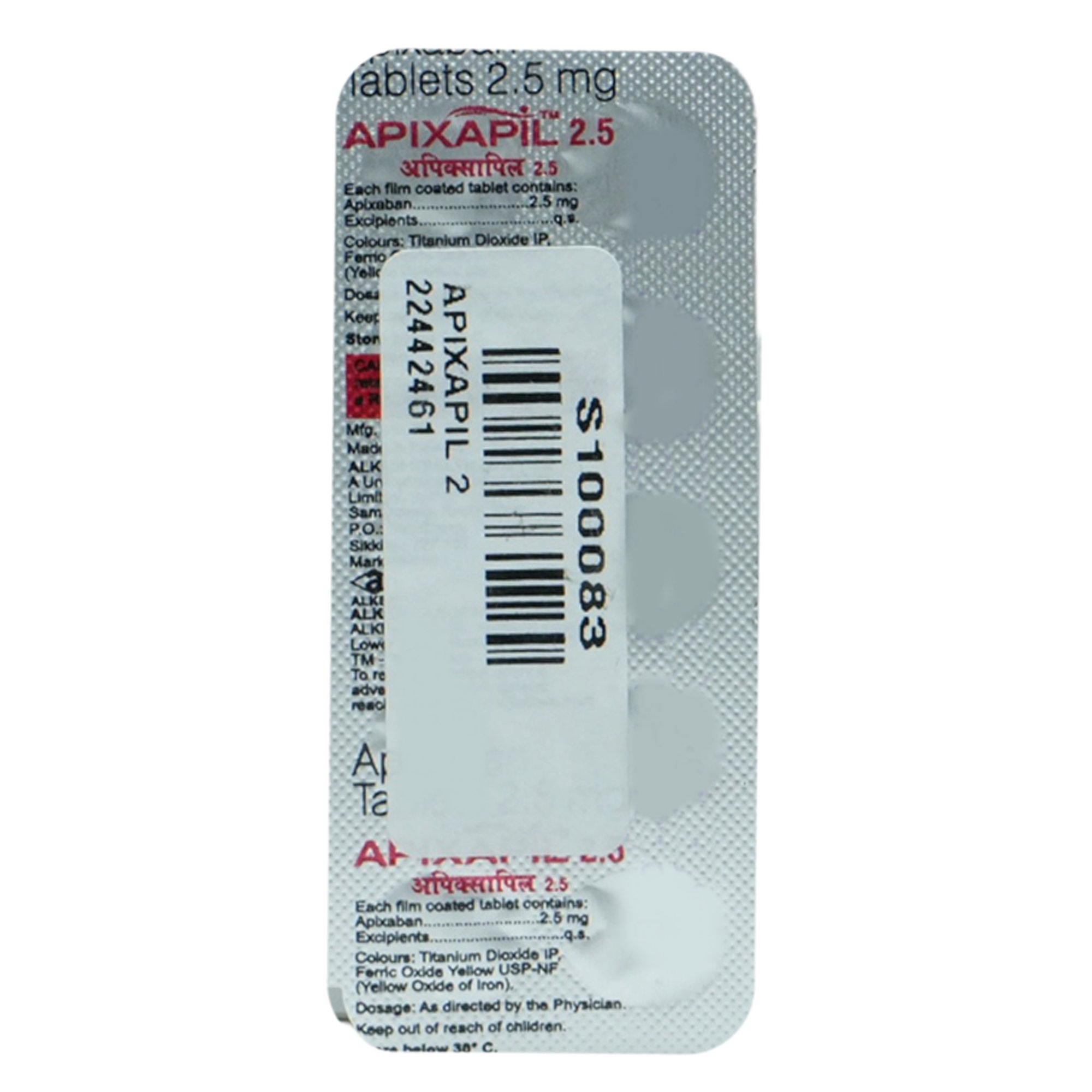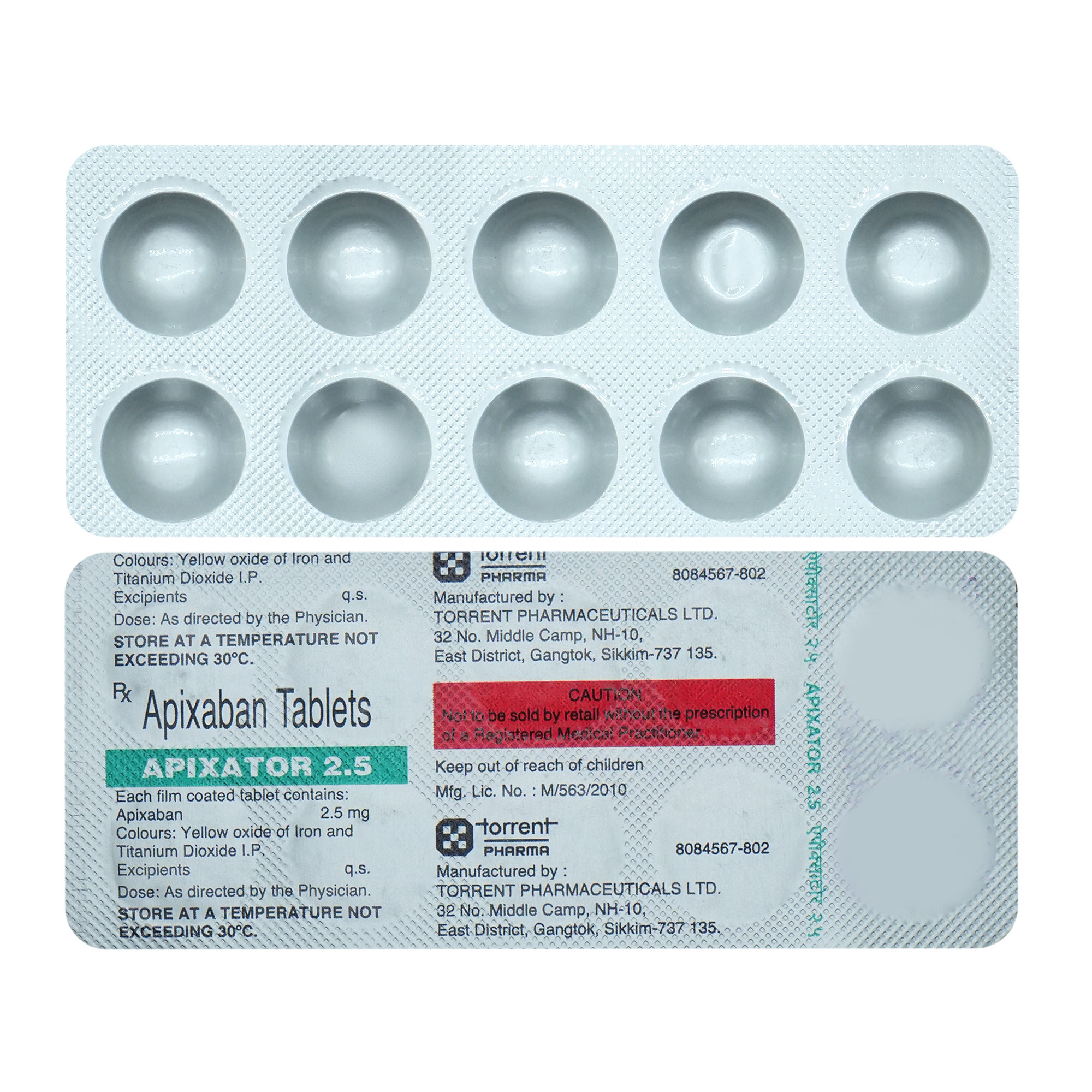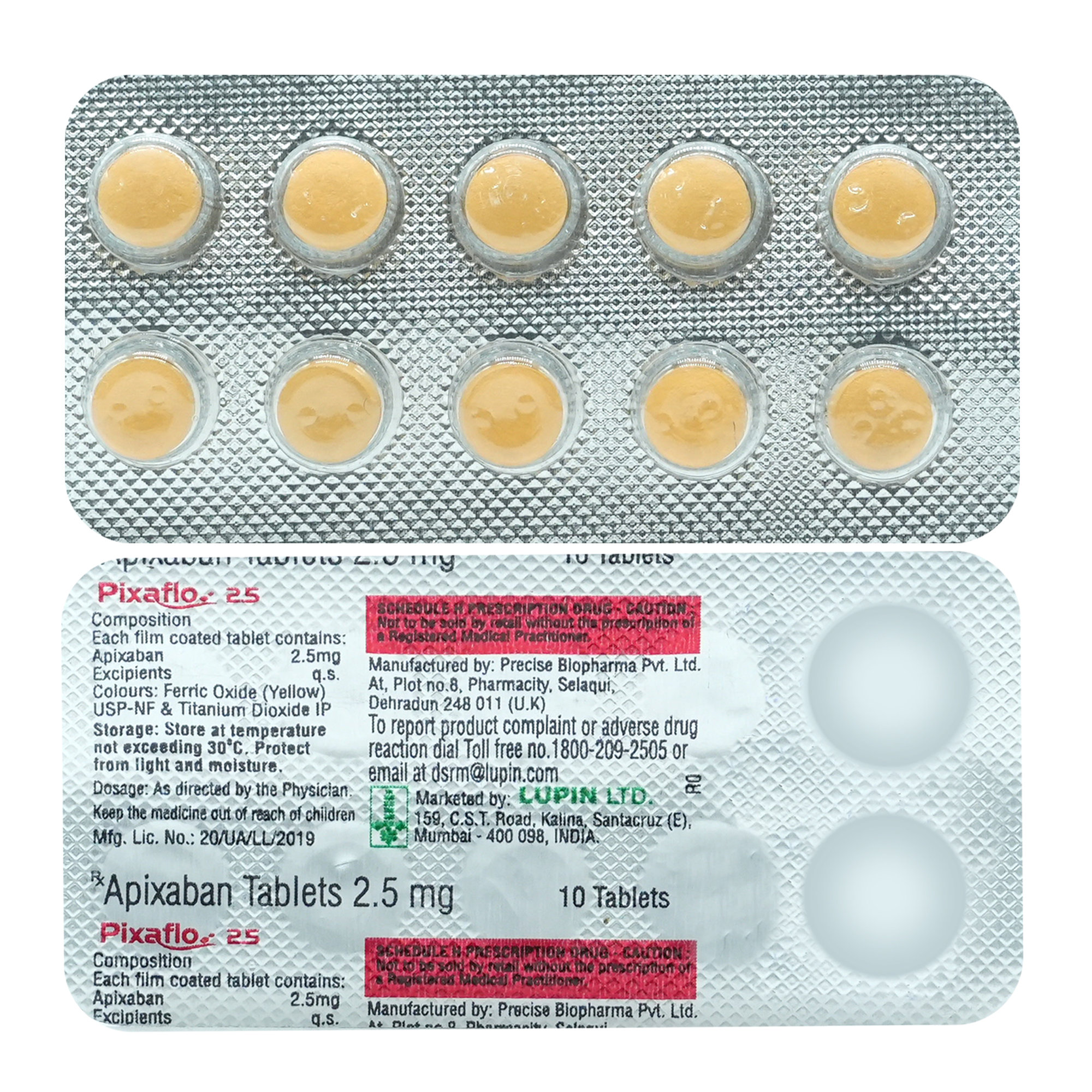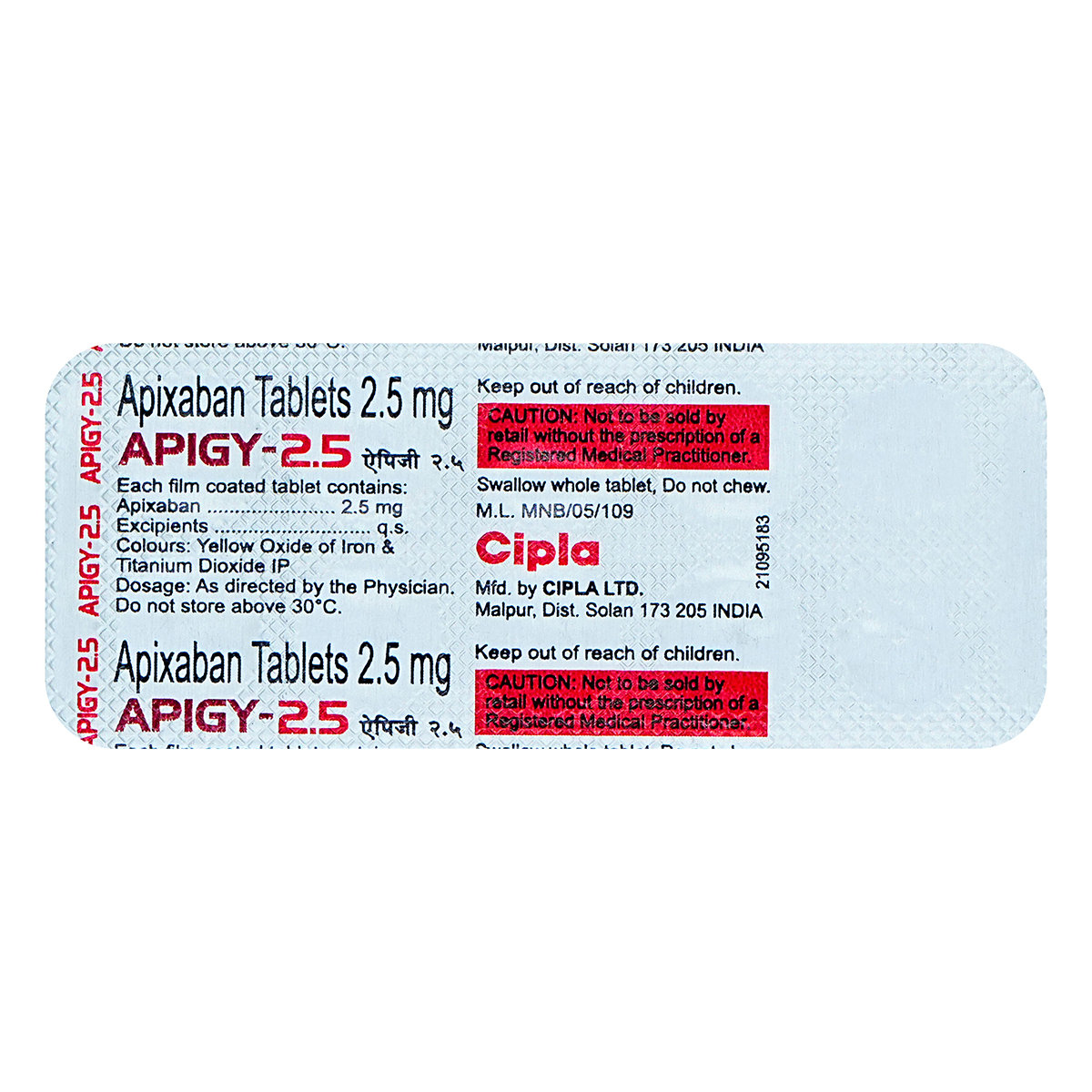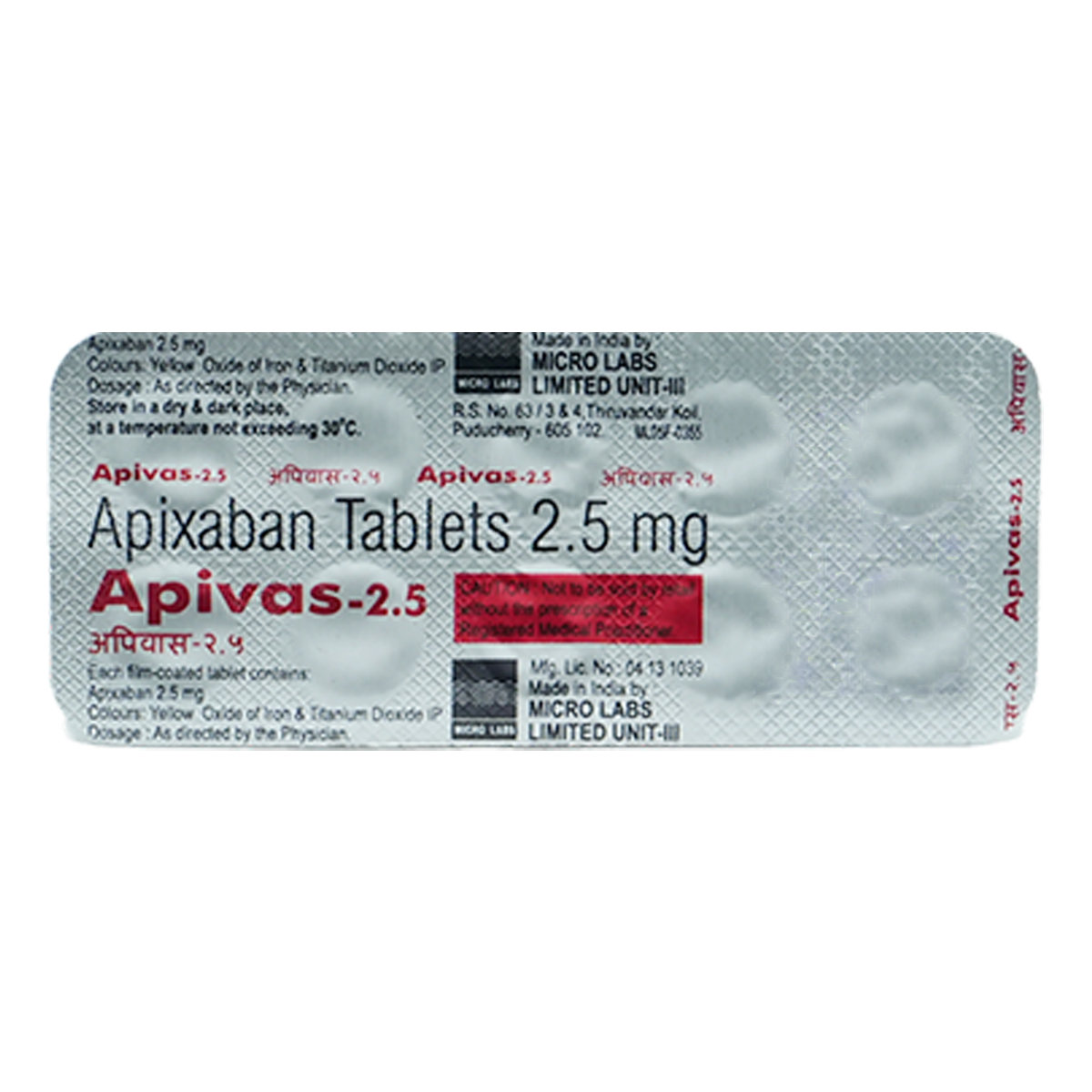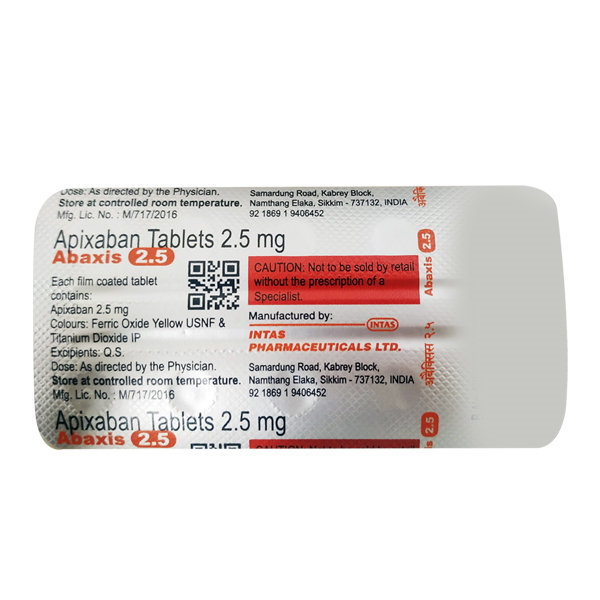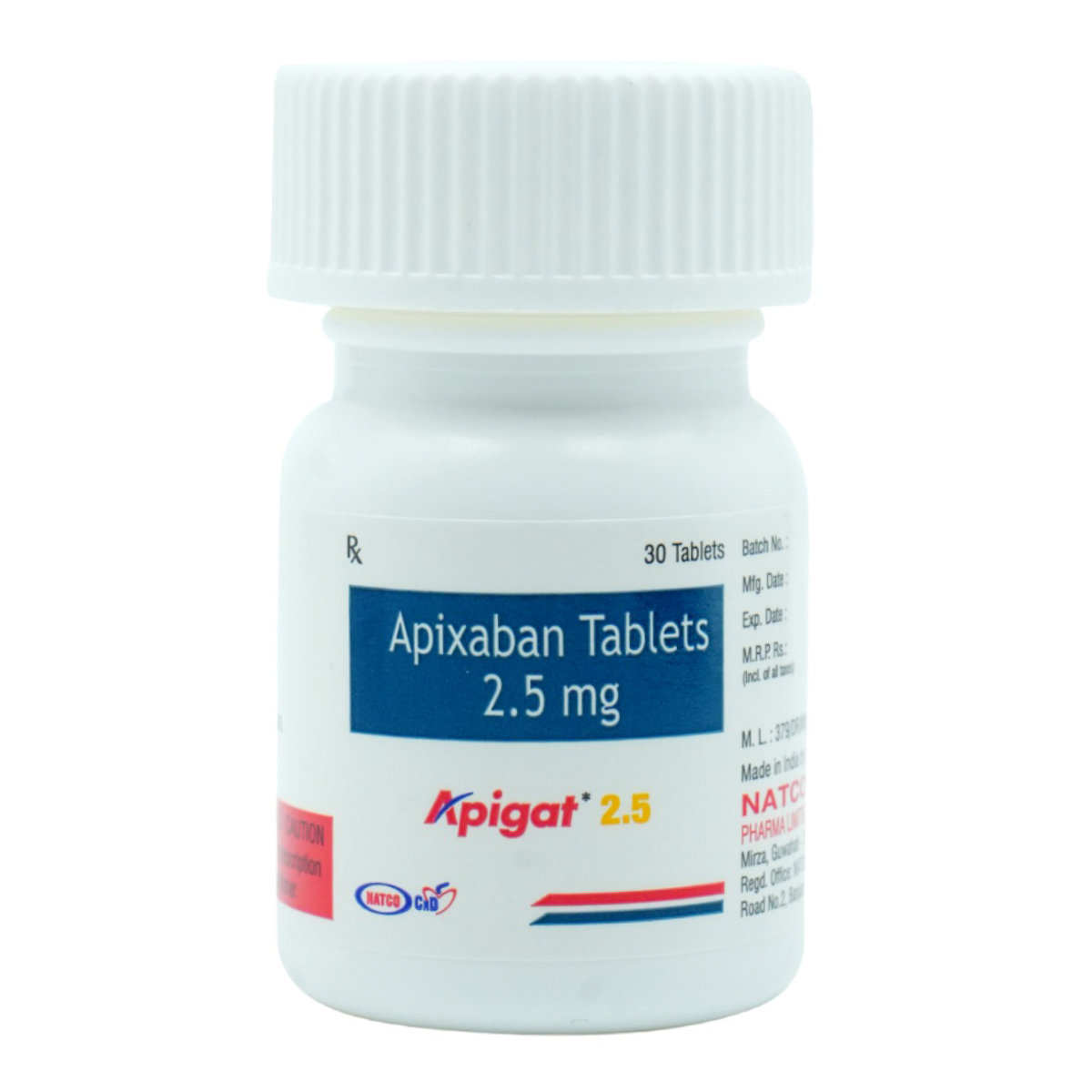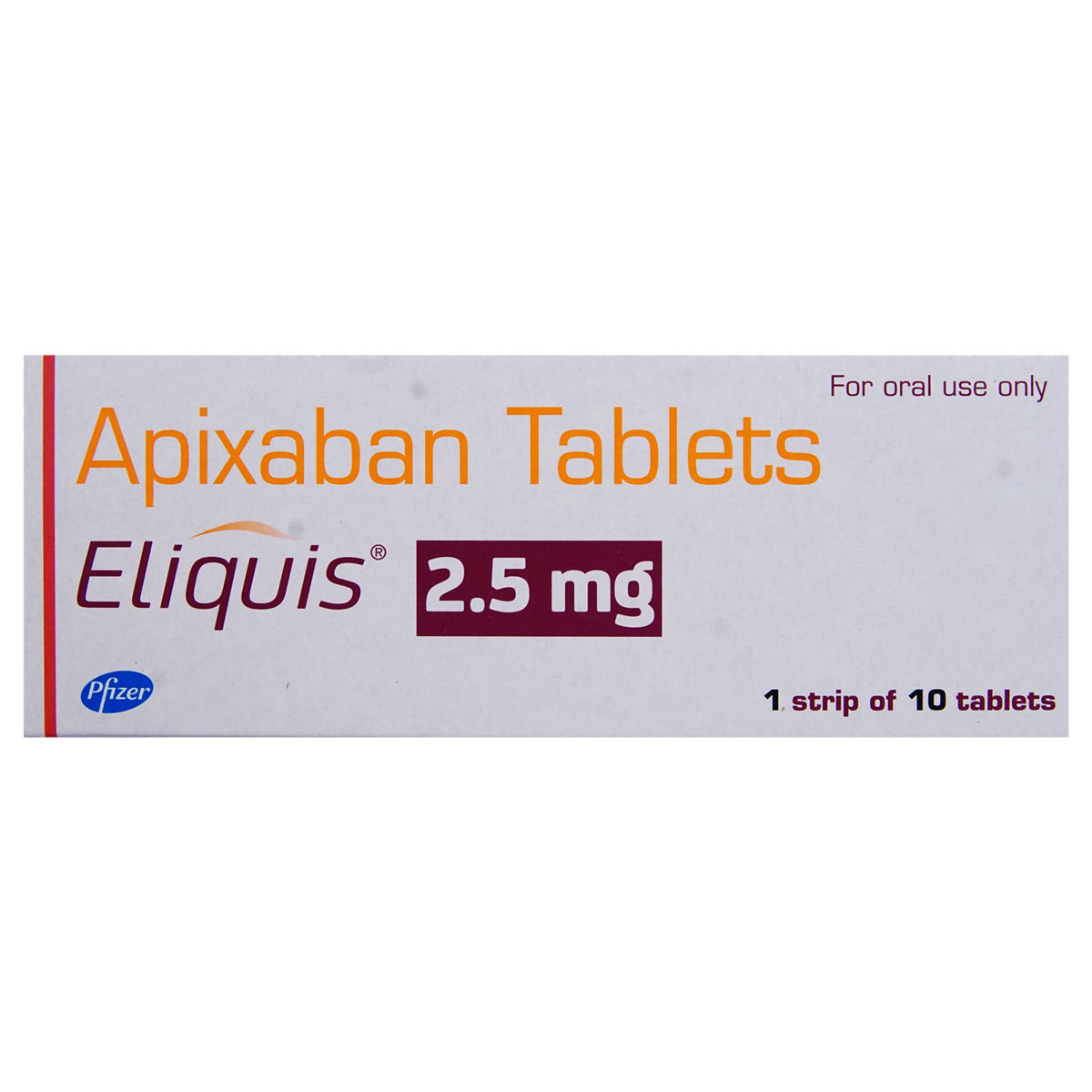Apxaban 2.5 Tablet
MRP ₹349
(Inclusive of all Taxes)
₹52.4 Cashback (15%)
Provide Delivery Location
Online payment accepted
 Prescription drug
Prescription drugWhats That
About Apxaban 2.5 Tablet
Apxaban 2.5 Tablet belongs to a class of drugs called 'anticoagulants' (blood thinners) primarily used to prevent and treat deep vein thrombosis (blood clots in leg veins) and pulmonary embolism (blood clots in the lung). Additionally, Apxaban 2.5 Tablet is used to prevent blood clots in patients with atrial fibrillation (irregular heartbeat). Deep vein thrombosis is a condition in which blood clots form in deep veins usually in the legs. Pulmonary embolism is a condition in which a blood clot blocks the arteries in the lungs. Atrial fibrillation is a condition that causes irregular, often fast heartbeat.
Apxaban 2.5 Tablet contains Apixaban that works by inhibiting the action of blood clotting factor (X a) which is an important element of blood clotting. Thereby, it prevents the conversion of fibrinogen (soluble protein) to fibrin (insoluble protein) and helps in preventing blood clot formation.
Take Apxaban 2.5 Tablet as prescribed. Your doctor will advise you how often you take Apxaban 2.5 Tablet based on your medical condition. Some people may experience nausea, anemia (lack of blood), and unusual bleeding, including swelling and bruising. Most of these side effects of Apxaban 2.5 Tablet do not require medical attention and gradually resolve over time. However, if the side effects persist or worsen, please consult your doctor.
If you are known to be allergic to Apxaban 2.5 Tablet or any other medicines, please tell your doctor. If you are pregnant or a nursing mother, it is advised to consult a doctor before using Apxaban 2.5 Tablet. If you have a stomach ulcer, recent bleeding in the brain, kidney or liver problems, high blood pressure, or bleeding problems, inform your doctor before taking Apxaban 2.5 Tablet. Your doctor may suggest a blood test called 'international normalized ratio' (INR) to check how quickly your blood's clotting. This test result will help your doctor to decide exactly when you should start taking Apxaban 2.5 Tablet.
Uses of Apxaban 2.5 Tablet
Directions for Use
Key Benefits
Apxaban 2.5 Tablet is primarily used to prevent and treat blood clots in the body by inhibiting the action of clotting factor Xa which is important element of blood clotting. Thereby, prevents conversion of fibrinogen to fibrin (a protein that binds platelets together and forms a clot) and helps in preventing blood clots formation.
Storage
- If you experience low blood pressure symptoms like dizziness, lightheadedness, or fainting while taking medication, seek immediate medical attention.
- Make lifestyle modifications and adjust your medication regimen under medical guidance to manage low blood pressure.
- As your doctor advises, regularly check your blood pressure at home. Record your readings to detect any changes and share them with your doctor.
- Fluid intake plays a vital role in managing blood pressure by maintaining blood volume, regulating blood pressure, and supporting blood vessel function. Drinking enough fluids helps prevent dehydration, maintain electrolyte balance, and regulate fluid balance.
- Take regular breaks to sit or lie down if you need to stand for long periods.
- When lying down, elevate your head with extra pillows to help improve blood flow.
- Avoid heavy exercise or strenuous activities that can worsen low blood pressure.
- Wear compression socks as your doctor advises to enhance blood flow, reduce oedema, and control blood pressure.
- If symptoms persist or worsen, or if you have concerns about your condition, seek medical attention for personalized guidance and care.
- Inform your doctor about dizziness symptoms. They may adjust your medication regimen or prescribe additional medications to manage symptoms.
- Follow your doctor's instructions for taking medication, and take it at the same time every day to minimize dizziness.
- When standing up, do so slowly and carefully to avoid sudden dizziness.
- Avoid making sudden movements, such as turning or bending quickly, which can exacerbate dizziness.
- Drink plenty of water throughout the day to stay hydrated and help alleviate dizziness symptoms.
- If you're feeling dizzy, sit or lie down and rest until the dizziness passes.
- Track when dizziness occurs and any factors that may trigger it, and share this information with your doctor to help manage symptoms.
- Inform your doctor about dizziness symptoms. They may adjust your medication regimen or prescribe additional medications to manage symptoms.
- Follow your doctor's instructions for taking medication, and take it at the same time every day to minimize dizziness.
- When standing up, do so slowly and carefully to avoid sudden dizziness.
- Avoid making sudden movements, such as turning or bending quickly, which can exacerbate dizziness.
- Drink plenty of water throughout the day to stay hydrated and help alleviate dizziness symptoms.
- If you're feeling dizzy, sit or lie down and rest until the dizziness passes.
- Track when dizziness occurs and any factors that may trigger it, and share this information with your doctor to help manage symptoms.
Drug Warnings
Apxaban 2.5 Tablet should not be used in children. Blood tests are advised before and while taking Apxaban 2.5 Tablet to monitor kidney and liver functioning. If you are pregnant or breastfeeding, please inform your doctor before taking Apxaban 2.5 Tablet. If you have a stomach ulcer, recent bleeding in the brain, kidney or liver problems, high blood pressure or bleeding problems, antiphospholipid syndrome (an immune system disorder that causes an increased risk of blood clots), inform your doctor before taking Apxaban 2.5 Tablet.
Drug-Drug Interactions
Drug-Drug Interactions
Login/Sign Up
Coadministration of Defibrotide and Apxaban 2.5 Tablet co-administration may raise the risk of bleeding.
How to manage the interaction:
Even though combining Defibrotide and Apxaban 2.5 Tablet may cause an interaction, it is still possible to take it if your doctor advises you to. Consult a doctor if you experience symptoms like blood in your urine or stool (or a black stool), severe bruising, prolonged nosebleeds, vomiting blood or coughing up blood, heavy menstrual bleeding (in women), difficulty breathing, or chest pain. Without consulting a doctor, never stop taking any medications.
Mifepristone and Apxaban 2.5 Tablet co-administration have been associated with more severe vaginal bleeding in women.
How to manage the interaction:
Taking Apxaban 2.5 Tablet with Mifepristone together is not generally recommended as it may lead to an interaction, but it can be taken if prescribed by a doctor. However, if you experience persistent, excessive bleeding, consult the doctor. Without consulting a doctor, never stop taking any medication.
Apxaban 2.5 Tablet's blood levels can be considerably lowered by taking it along with Enzalutamide. This might reduce the Apxaban 2.5 Tablet's ability to treat and prevent blood clots.
How to manage the interaction:
Although the Co-administration of Enzalutamide and Apxaban 2.5 Tablet can possibly lead to an interaction, they can be taken in case a doctor advises it to. Do not discontinue any medications without a doctor's advice.
Combining Ipilimumab and Apxaban 2.5 Tablet may raise the risk of stomach bleeding and ulcers.
How to manage the interaction:
Even though there is an interaction between Apxaban 2.5 Tablet and Ipilimumab, they can be taken if a doctor prescribes it. If you experience potential gastrointestinal injury symptoms like abdominal pain, bloating, dizziness, lightheadedness, loss of hunger, nausea, vomiting (especially with either dry or fresh blood that looks like coffee grounds), and red or black stool, you should see a doctor right away. Without consulting a doctor, never stop taking any medication.
Apxaban 2.5 Tablet's blood levels can be considerably lowered by taking it along with Rifapentine.
How to manage the interaction:
Although Co-administration of Rifapentine and Apxaban 2.5 Tablet can lead to an interaction, they can be taken in case a doctor advises it to. Rifapentine makes Apxaban 2.5 Tablet less effective in treating and preventing blood clots. Never discontinue taking a medication without consulting a doctor.
Telaprevir may significantly increase the blood levels of Apxaban 2.5 Tablet. This can increase the risk of serious bleeding complications.
How to manage the interaction:
Even though combining Telaprevir and Apxaban 2.5 Tablet may cause an interaction, it is still possible to take it if your doctor advises you to. Consult a doctor if you experience symptoms like blood in your urine or stool (or a black stool), severe bruising, prolonged nosebleeds, feeling dizzy or lightheaded, weakness or severe headache, vomiting blood or coughing up blood, heavy menstrual bleeding (in women), difficulty breathing, or chest pain. Without consulting a doctor, never stop taking any medications.
Coadministration of Dasatinib and Apxaban 2.5 Tablet co-administration may raise the risk of bleeding.
How to manage the interaction:
Even though combining Dasatinib and Apxaban 2.5 Tablet may cause an interaction, it is still possible to take it if a doctor advises you to. Consult a doctor if you experience symptoms like dizziness; red or black, tarry stools; severe headache; and weakness. Without consulting a doctor, never stop taking any medications.
Combining deferasirox and Apxaban 2.5 Tablet may raise the risk of stomach bleeding and ulcers.
How to manage the interaction:
Even though there is an interaction between Apxaban 2.5 Tablet and Deferasirox, they can be taken if a doctor prescribes it. If you experience potential gastrointestinal injury symptoms like abdominal pain, bloating, dizziness, lightheadedness, loss of hunger, nausea, vomiting (especially with either dry or fresh blood that looks like coffee grounds), and red or black stool, consult a doctor. Without consulting a doctor, never stop taking any medication.
Mefenamic acid and Apxaban 2.5 Tablet co-administration may raise the risk of bleeding.
How to manage the interaction:
Even though combining Mefenamic acid and Apxaban 2.5 Tablet may cause an interaction, it is still possible to take it if your doctor advises you to. Consult a doctor if you experience symptoms like blood in your urine or stool (or a black stool), severe bruising, prolonged nosebleeds, feeling dizzy or lightheaded, weakness or severe headache, vomiting blood or coughing up blood, heavy menstrual bleeding (in women), difficulty breathing, or chest pain. Without first consulting your doctor, never stop taking any medications.
Coadministration of Warfarin and Apxaban 2.5 Tablet may raise the risk of bleeding.
How to manage the interaction:
Even though combining Warfarin and Apxaban 2.5 Tablet may cause an interaction, it is still possible to take it if a doctor advises you to. Consult a doctor if you experience symptoms like blood in your urine or stool (or a black stool), severe bruising, prolonged nosebleeds, feeling dizzy or lightheaded, weakness or severe headache, vomiting blood or coughing up blood, heavy menstrual bleeding (in women), difficulty breathing, or chest pain. Without consulting a doctor, never stop taking any medications.
Drug-Food Interactions
Drug-Food Interactions
Login/Sign Up
Diet & Lifestyle Advise
- Avoid vitamin K rich foods such as coriander, cabbage, spinach, broccoli, collard greens, kale (leaf cabbage), black liquorice, turnip greens, avocados, Brussels sprouts as they may decrease the effectiveness of Apxaban 2.5 Tablet.
- Do regular exercise as it helps to dissolve blood clots especially in obese people.
- Do not consume more than 14 units of alcohol per week as excess alcohol intake may increase the risk of bleeding and quit smoking.
Side Effects of Apxaban 2.5 Tablet
- Nausea
- Anaemia (lack of blood)
- Bleeding including swelling and bruising
Habit Forming
Therapeutic Class
All Substitutes & Brand Comparisons
RX
Cadiquis 2.5 Tablet 10's
Cadillac Lifesciences Pvt Ltd
₹51
(₹4.6 per unit)
85% CHEAPERRX
Apixapil 2.5 Tablet 10's
Alkem Laboratories Ltd
₹84.5
(₹7.61 per unit)
75% CHEAPERRX
Elixaban 2.5 Tablet 10's
Sun Pharmaceutical Industries Ltd
₹122.5
(₹11.03 per unit)
64% CHEAPER
Author Details
We provide you with authentic, trustworthy and relevant information
Drug-Diseases Interactions
Drug-Diseases Interactions
Login/Sign Up
Factor Xa inhibitors should not be used in individuals who have active pathological bleeding since they raise the risk of bleeding and have the potential to result in serious or fatal haemorrhages. Factor Xa inhibitors should only be prescribed with caution to patients who are at a higher risk of bleeding, such as those who are undergoing procedures where bleeding could result in life-threatening consequences.
How to manage the interaction:
Apxaban 2.5 Tablet therapy is not recommended for patients with a history of bleeding disorder since it can worsen the condition, which can be fatal. It can be taken if your doctor has advised it. However, if you notice any unusual bleeding or bruising, other signs of bleeding, dizziness, lightheadedness, red or black tarry stools, coughing up or vomiting blood, severe headache, and weakness, you should contact your doctor immediately. Do not stop using any medications without first talking to your doctor.
In individuals with moderate or severe liver impairment (Child-Pugh B or C), the use of factor Xa inhibitors (including Apxaban 2.5 Tablet and edoxaban) is not advised because these patients may have intrinsic coagulation problems.
How to manage the interaction:
Apxaban 2.5 Tablet therapy is generally avoided in patients with a history of liver diseases since it can worsen the condition, which can be fatal. It can be taken if your doctor has advised it. However, if you notice any unusual bleeding or bruising, other signs of bleeding, Skin and eyes that appear yellowish, abdominal pain and swelling, dizziness, lightheadedness, red or black tarry stools, dark urine, coughing up or vomiting blood, severe headache, and weakness, you should contact your doctor immediately. Do not stop using any medications without first talking to your doctor.
Patients who have artificial heart valves shouldn't use some factor Xa inhibitors, such as Apxaban 2.5 Tablet, edoxaban, and rivaroxaban, as their safety and effectiveness have not been proven in this population.
How to manage the interaction:
Apxaban 2.5 Tablet therapy is generally avoided in patients with a history of heart disease since it can worsen the condition, which can be fatal. It can be taken if your doctor has advised it. However, if you notice any unusual bleeding or bruising, other signs of bleeding, dizziness, lightheadedness, palpitations, chest pain or discomfort, and weakness, you should contact your doctor immediately. Do not stop using any medications without first talking to your doctor.
In individuals with antiphospholipid syndrome (APS), direct-acting oral anticoagulants such as factor Xa inhibitors and some thrombin inhibitors like dabigatran are not advised. Increased rates of recurrent thrombotic events have been linked to the use of these medications, particularly in individuals with triple-positive APS.
How to manage the interaction:
Apxaban 2.5 Tablet therapy is generally avoided in patients with a history of bleeding disorder since it can worsen the condition, which can be fatal. It can be taken if your doctor has advised it. However, if you notice any unusual bleeding or bruising, other signs of bleeding, dizziness, lightheadedness, red or black tarry stools, dark urine, coughing up or vomiting blood, severe headache, and weakness, you should contact your doctor immediately. Do not stop using any medications without first talking to your doctor.
FAQs
Drug-Drug Interactions Checker List
- ASPIRIN
- CLOPIDOGREL
- DILTIAZEM
- HEPARIN
- IBUPROFEN
- NAPROXEN
- RIVAROXABAN
Special Advise
Complete blood count (CBC), INR test, prothrombin tests are advised before and while taking Apxaban 2.5 Tablet.
Disease/Condition Glossary
Deep vein thrombosis (blood clots in legs) is a medical condition in which blood clots form in deep veins usually in legs. The symptoms include leg pain or swelling.
Pulmonary embolism (blood clots in lung) is a condition which occurs as the blood clots break and travel to lungs from deep veins in the legs or other parts of the body. The symptoms of pulmonary embolism include cough, chest pain and shortness of breath. Quick medication is advised to reduce the risk of serious conditions due to blood clots.
Atrial fibrillation is a condition that causes irregular, often fast heartbeat. In atrial fibrillation condition, blood clots are formed as blood is pooled in the upper chambers of heart.

Have a query?
Alcohol
Safe if prescribed
You are recommended not to consume more than 14 units per week as exceeding this may increase the risk of bleeding.
Pregnancy
Consult your doctor
Apxaban 2.5 Tablet is a Category B pregnancy drug and is given to pregnant women only if doctor thinks benefits outweigh risks.
Breast Feeding
Consult your doctor
Avoid breastfeeding while taking Apxaban 2.5 Tablet as it may be excreted in breast milk and cause adverse effects in the baby.
Driving
Safe if prescribed
Apxaban 2.5 Tablet usually does not affect your ability to drive or operate machinery.
Liver
Consult your doctor
Take Apxaban 2.5 Tablet with caution, especially if you have a history of Liver diseases/conditions. The dose may be adjusted by your doctor as required.
Kidney
Consult your doctor
Take Apxaban 2.5 Tablet with caution, especially if you have a history of Kidney diseases/conditions. The dose may be adjusted by your doctor as required.
Children
Safe if prescribed
Apxaban 2.5 Tablet is not recommended for children below 18 years of age.




